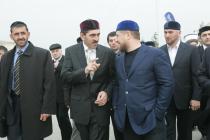The hero’s non-return By Akhmed Ozdoyev, special to Prague Watchdog
In mid-November it seemed that the mystery of Yunus-Bek Yevkurov had been ingeniously resolved. A journalist discovered a remarkable formula which was seized on by the Russian media as a fully-fledged theory to describe the new Ingush President’s action plan. The theory blithely suggests that Yevkurov is bringing back “Aushev’s team”.
Indeed, among the people who have been recruited into the government over the past few days it is easy to spot faces that were familiar during the presidency of Ruslan Aushev. Today, those times live in the memory of the Ingush as a “golden age”, the value of which they had not appreciated and were therefore unable to save. The era of peace and well-being is now perceived as a mythological, irrecoverable past, on which the Ingush base their idea of absolute happiness. And now Aushev is returning. Not in person, however, but as his “team” – the faithful apostles of democracy and economic prosperity.
When Ruslan Sultanovich Aushev came to power he created something of a revolution in the sphere of government appointments. No one could conceive that that key posts in the republic would be given to young men, many of whom were not yet 30. In the Caucasus, power is seen as a responsibility linked to wisdom and talent. It is, above all, the ability to move away from the call of the blood, the age-old norms that are obligatory for all, the rules that preserve the code of survival for the family, the tribe, and today also the nation. To rise above the interests of the group, of blood kinship, and truly enter the domain of public interests as a specialist and a civil servant of God, is the lot of only a few.
Meanwhile, as a Soviet military officer Aushev knew that young men find it particularly hard to breathe in the narrow space of archaic ethnic beliefs, and that they are the first to be willing to start the painful process of modernization, in order to destroy an order that prevents any development. In the army, tribal loyalties based on a shared ethnicity were able to survive only on the most primitive level – where bullying [dedovshchina] flourished, those who were fellow countrymen found it easy to form the dominant group. But in combat situations in Afghanistan those relations fell apart, as ethnic brotherhood was replaced by a community of soldiers whose ethnic identity retreated into the background, with fighting efficiency and functionality occupying the leading role.
Those who today rejoice in the “return of Aushev” must understand that an efficient manager is by default a person without a conscience. He can perform any task – it all depends on how it is presented.
Remember the film The Magnificent Seven. Seven men who were friends in their past lives are picked at random and gathered together by a leader in order to ensure the protection of a small Mexican village that is suffering from bandit raids. None of these men see things in the same way. One of them is a loser, another has become a swindler, and under different circumstances he might easily have been a bandit. But they are all united by the will of the man who has gathered them together. And he wants only one thing – to help others. That is the rule, the goal and precondition of their work.
The fact that Yevkurov has hired people from Aushev’s team is of no significance at all. What really matters is whether he has a mission for the “team”, whether he is ready to protect the village.
The scene in which the President of the Republic makes an indecipherable response to people’s stories of the torture to which their relatives were subjected drops the image of the paratrooper-hero firmly in the mud. And even as this conversation takes place, standing behind the hero’s back (now contemptuous, now smirking) are those who either bear direct responsibility for the torture or were present during it and ordered it. However much we may have mythologized our memory of President Aushev, we cannot conceive that he gave torturers the right to smirk and celebrate as calmly as Yevkurov did.
Has Yevkurov come to protect the village? One would like to think so, but somehow that is becoming increasingly difficult.
The photograph is borrowed from the blog chet_nik's journal. (Translation by DM) (P/T) RELATED ARTICLES:
·
· Operation search and destroy (PW, 31.10.2008)
DISCUSSION FORUM
|

